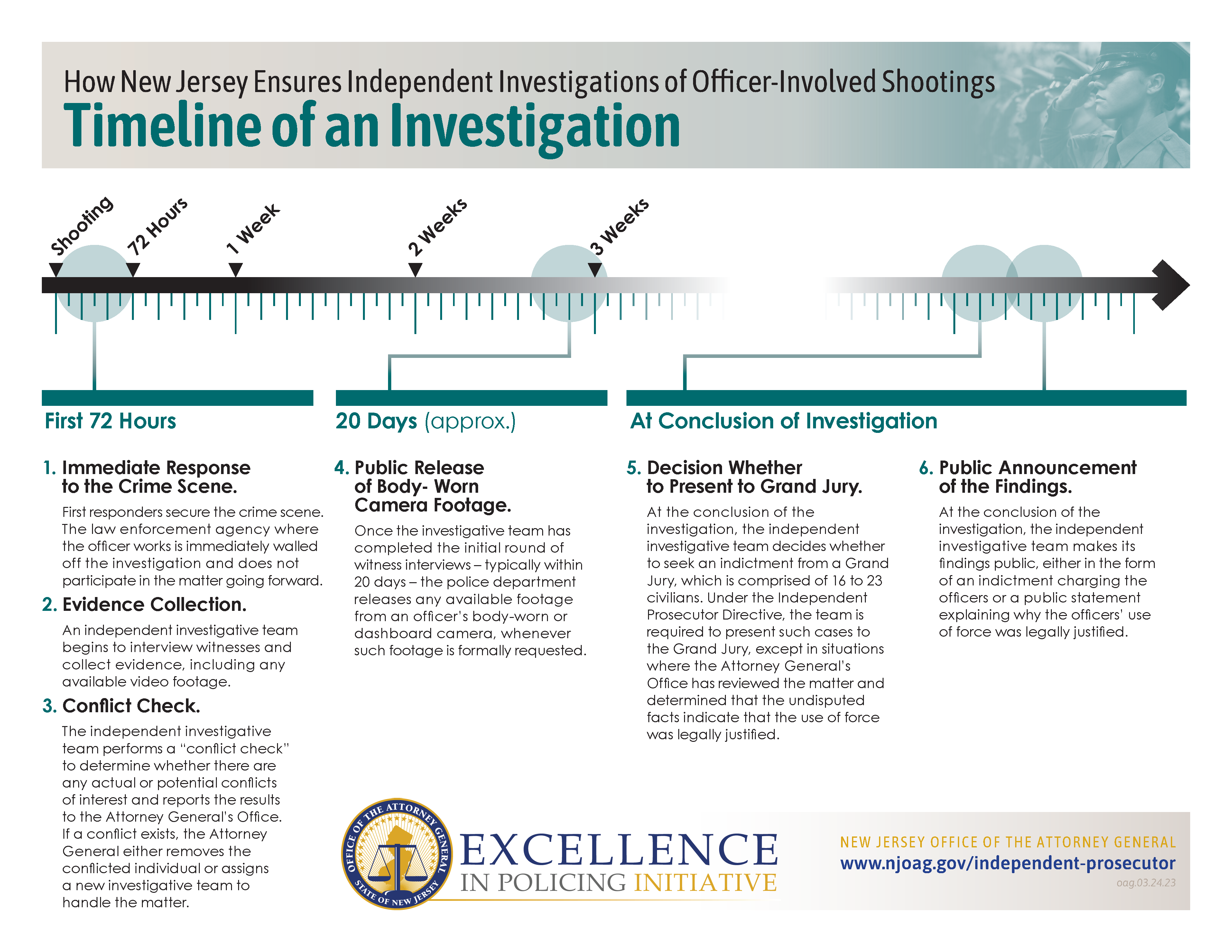Independent Investigations of Officer-Involved Shootings
New Jersey has one of the country’s farthest-reaching policies for responding to and investigating officer-involved shootings. In 2015, the New Jersey Attorney General issued the “Independent Prosecutor Directive,” establishing a process to ensure that officer-involved shootings be investigated fully, fairly, and independently of any potential bias. The Directive applies to any discharge of a firearm by a law enforcement officer in the course of his or her duties, regardless of whether the shooting resulted in death.
The Directive was drafted in close consultation with both law enforcement organizations and civil rights groups, including the NAACP, the Latino Leadership Alliance, and the New Jersey Institute for Social Justice, and is rooted in three principles: independence, transparency, and accountability.
Ensuring Independence
- Under the Independent Prosecutor Directive, all officer-involved shootings in New Jersey are investigated by a team of prosecutors and law enforcement professionals that is completely independent of the agencies that employ any of the officers involved in the shooting.
- The team of independent investigators takes additional steps to ensure that there are no conflicts of interest between them and the officers they are investigating. For example, within 72 hours of the shooting, the investigative team must conduct a “conflicts check,” where they examine whether they have any personal or professional relationships with those under investigation and then report the results to the Attorney General’s Office to determine whether recusal is required.
Ensuring Transparency
- After an officer-involved shooting, it is crucial that interested members of the community be able to receive accurate information about the incident. Oftentimes, this involves reviewing footage captured by an officer’s body-worn or dashboard video camera. The Attorney General requires that, if a member of the public or news media formally requests such footage, the law enforcement agency should release it as soon as possible after completing the initial round of witness interviews – usually, about twenty days after the shootings.
- One of the most difficult decisions prosecutors must make when investigating an officer-involved shooting is whether to present their case to a grand jury for indictment. By presenting the case, prosecutors allow a panel of 16 to 23 civilians to decide whether to issue criminal charges against the officers involved. Under the Independent Prosecutor Directive, the prosecutor is required to present such cases to the grand jury, except in situations whether the Attorney General’s Office has reviewed the matter and determined that the undisputed facts indicate that the use of force was legally justified.
- At the end of the investigation, the independent prosecutors must release public information about the shooting – either in the form of a criminal indictment against those involved or a public statement explaining why criminal charges were not warranted.
Other Statewide Initiatives to Address Unnecessary Use-of-Force
The Attorney General’s Office has implemented a number of other policies to limit the likelihood of officer-involved shootings – and to reduce the likelihood of conflict when such shootings do happen.
- De-escalation training. In 2016, the AG’s office created the “Community-Law Enforcement Affirmative Relations” (CLEAR) Continuing Education Institute, which provides training to law enforcement officers statewide on important topics, including de-escalation tactics, cultural awareness, and community policing.
- Public education for safe traffic stops. In 2017, the AG’s office launched “Operation Safe Stop,” which is designed to educate the public about they should do – and not do – when interacting with officers during a traffic stop. AG Grewal believes these programs are essential to the work of the Office. [Safe Stop website]
- “Early Warning Systems” for law enforcement agencies. In March 2018, Attorney General Grewal issued a new statewide policy requiring that all police departments in New Jersey create “early warning systems” to identify officers at risk for harmful behavior and mandate remedial programs for them before their conduct escalates.
- Community policing project. In spring 2018, Attorney General Grewal launched the “21 County, 21st Century Community Policy Project,” known as the “21/21 Project.” All 21 County Prosecutors are required to organize four public events per year, each one focused on a specific topic, and with the goal of encouraging dialogue between law enforcement officers and the communities they serve. [21/21 website]
Fact Sheets
- Overview of Independent Prosecutor Directive. An overview of the key aspects of the Independent Prosecutor Directive. [Fact Sheet]
- Timeline of an Investigation. The chronology of a typical investigation under the Independent Prosecutor Directive. [Timeline]
Key Documents
- The Independent Prosecutor Directive. In July 2015, Acting Attorney General John Hoffman issued the “Independent Prosecutor Directive,” which governs investigations of officer-involved shootings.
- Body-Worn Camera Transparency Directive. In March 2018, Attorney General Grewal issued AG Directive 2018-1, which instructs law enforcement agencies to release video footage of an officer-involved shooting captured by an officer’s body-worn camera or patrol vehicle dashboard-mounted cameras. The Directive called on agencies to release the footage after the initial investigation is substantially complete, typically within 20 days of the incident.
- Early Warning Systems Directive. In March 2018, Attorney General Grewal issued AG Directive 2018-3, which requires that all police departments and other law enforcement agencies in New Jersey to establish “Early Warning Systems.”
- CLEAR Institute Directive. In October 2016, Attorney General Christopher Porrino issued AG Directive 2016-5, which established the “Community-Law Enforcement Affirmative Relations” (CLEAR) Continuing Education Institute.



